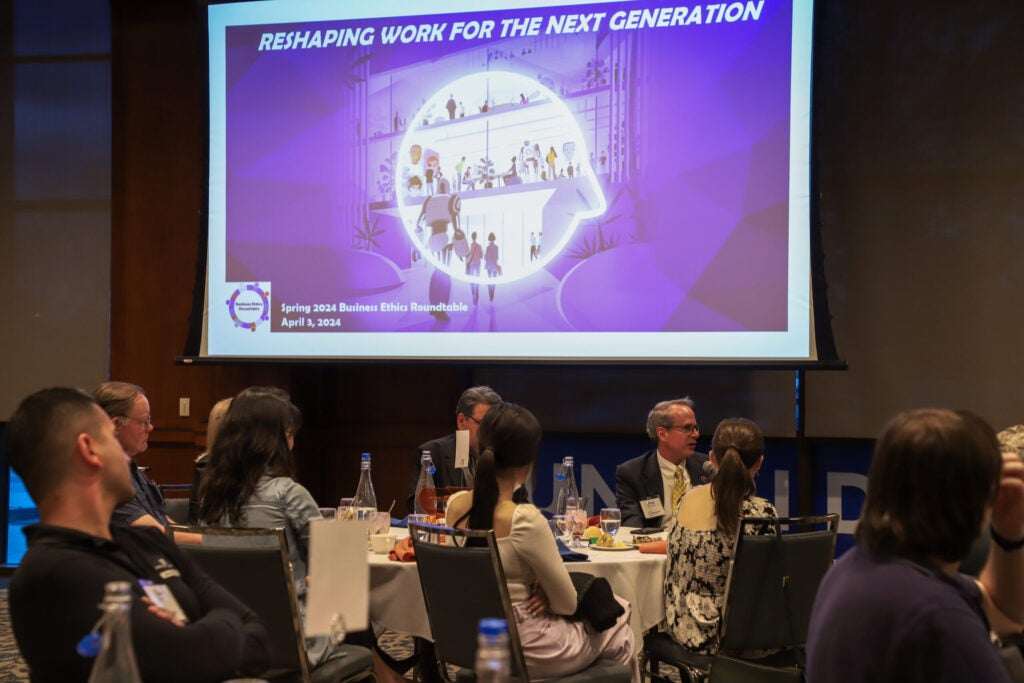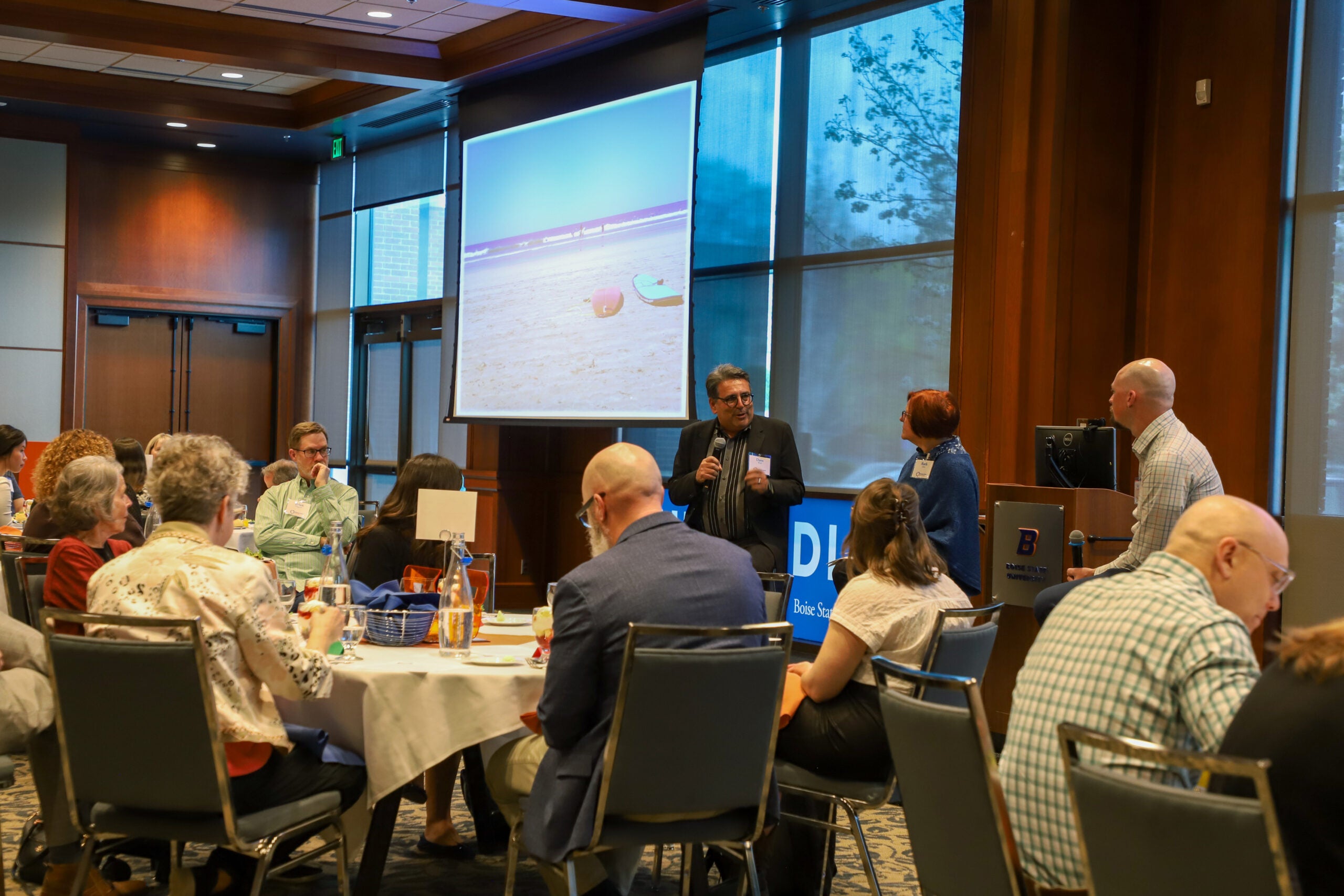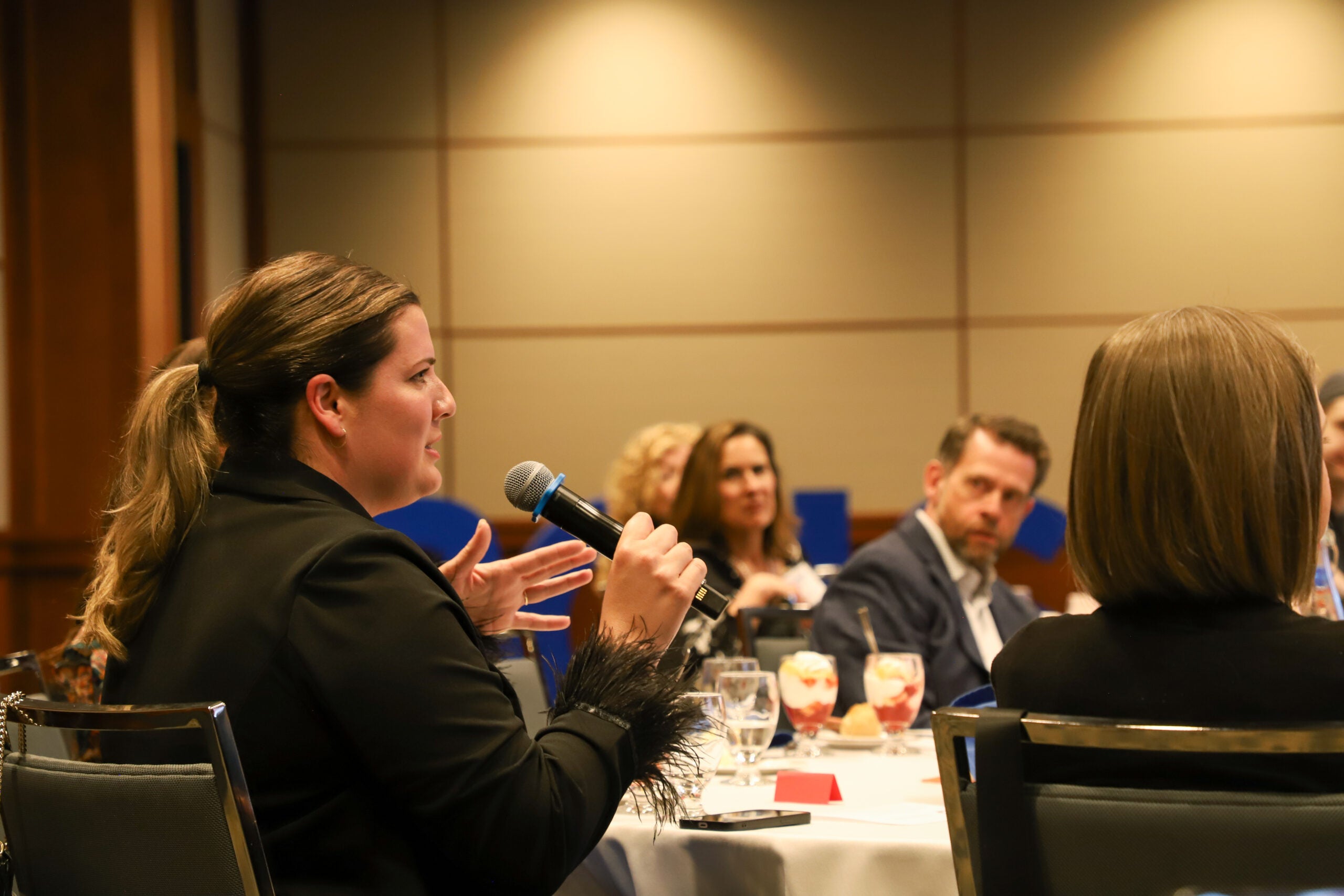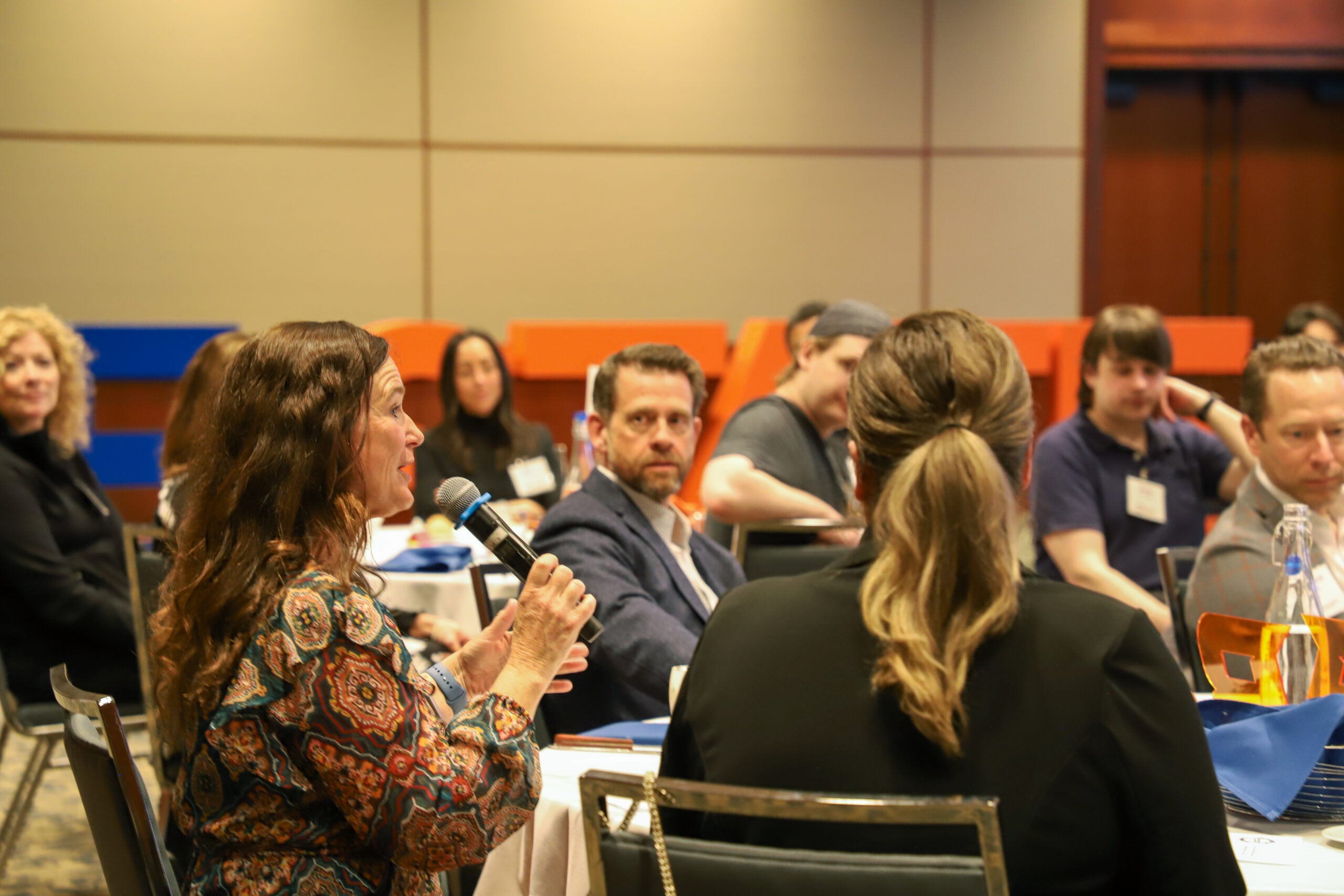What will work be like in the future? Will workers continue to want the flexibility of remote work? How will the pending retirement of millions of Baby Boomer workers affect the workplace landscape? Can we integrate AI into work without unduly harming workers? On April 3, 2024, Boise State University students and faculty gathered with community members to explore the changing world of work at the spring 2024 Business Ethics Roundtable. The dinner table conversations focused on the challenges and opportunities that both employers and employees face as our notions of work evolve, with opening thoughts provided by Boise business leaders Dave Wali (executive vice president at the Gardner Company) and Nate McIntyre (vice president of Engineering at Harvest).

The Forces Reshaping Work
Participants were provided with a handout with seven interesting facts about the changing workforce. This information was instrumental in helping participants understand what information currently exists regarding the changing workforce, but at many tables also helped prime multiple avenues of discussion.
Seven Interesting Facts about the Changing Workforce
- A recent Statista Research reveals that there are around 70.4 million freelancers in the U.S. Moreover, the numbers will likely reach 79.6 million by 2025 and 90.1 million by 2028. Plus, an estimate suggests that 50.9 percent of the total workforce in the U.S. will freelance by 2028.
- A recent study by the U.S. Census Bureau estimates that the nation’s 73 million baby boomers are aging, which will boost revenues for industries designed to help them manage their later years. A projection suggests that there will be 83.9 million people of age 65 and more by 2050, almost twice as much as in 2012. As a result, 1 out of 5 residents will attain retirement age by 2050.
- Statista suggests that the number of mobile workers in the United States will increase to 93.5 million by 2024 from 78.5 million in 2020. The source defines mobile workers as those who have been assigned tasks or workflows that require mobile devices, such as smartphones and tablets.
- Estimates indicate that one in four U.S. workers is a baby boomer, which amounts to a total of 41 million baby boomer employees. The trend of mass retirement will lead to a more significant workforce gap as companies scramble to fill vacant positions. As these workers usually hold higher-level management positions due to extensive experience, replacing them will be challenging, and many businesses will turn to recruiters for top talent.
- In August 2023, the Bureau of Labor Statistics found that 1 in 5 workers had teleworked that month. While the percentage of remote workers is lower than at the height of the COVID-19 pandemic, remote work will remain a permanent part of the labor landscape.
- According to a new study by Deloitte and the Manufacturing Institute, 2.1 million U.S. manufacturing jobs will likely go unfilled by 2030 due to the skills gap. The cost of unfilled jobs could potentially value US$1 trillion by 2030. Plus, approximately two million jobs will remain unfilled in the manufacturing sector by 2025 because of the accelerating retirement rates of current workers and an expected expansion in manufacturing in the coming years.
- Healthcare and tech are among the fastest-growing sectors of the U.S. economy. For instance, cyber security engineers, data scientists, cloud engineers, behavioral health technicians, robotics engineers, sales development representatives, and artificial intelligence specialists are the most in-demand jobs in 2022.
How Reshaped Work Affects the Community
To kick off discussions, Wali and McIntyre provided two perspectives on the evolving nature of work. While these perspectives did vary, they converged on the consensus that this nature has far-reaching implications for society. McIntyre questioned whether technology and AI are domains reserved for the youth, suggesting a seismic shift in the workforce as younger generations exhibit more flexibility and adaptability in embracing new technologies. This adaptability is not just about coping with change but leveraging it to achieve unprecedented productivity gains, with a single engineer potentially doing the work previously done by three or four. However, the integration of AI and the shift toward remote and gig work challenge traditional employment models, raising concerns about the erosion of white-collar jobs. To navigate these changes, McIntyre emphasized the importance of social systems and setting clear expectations, suggesting that companies should establish boundaries to balance innovation with worker well-being.

On the other hand, Dave Wali highlighted the impact of remote work on community structure and economic health. From a historical perspective, he noted that every company is shaped by the societal norms and practices of the preceding fifty years, suggesting that the shift toward remote work represents a significant departure from these norms. In particular, the U.S. experiences a form of social disconnection, or “anomaly,” as remote work becomes more prevalent, contrasting with trends in Europe and Asia where there’s a stronger push to return to the office. This has led to observable effects in local economies, such as the closure of downtown businesses in Treasure Valley due to decreased foot traffic, with only 65% of pre-pandemic levels of office usage. Furthermore, the debate on whether homes used as offices should be taxed at corporate rates indicates the broader “ripple effects” of these shifts. Wali’s observation that “work is a personal decision with collective consequences” encapsulates the dual nature of these changes—while individuals may benefit from greater flexibility, the cumulative impact on communities and economies is profound and multifaceted, necessitating thoughtful consideration and adaptation by all stakeholders.

Developing Strategies for the Future
As tables considered possible strategies for attracting talent and building the workforces we need, several key aspects and questions emerged:
Key Aspects and Questions
- Varying views of AI – some cautious, some fully embracing adoption.
- Stuff on the remote work issue – including its impact on the affordability of housing and the economic incentives for both employers and employees.
- Realities of multigenerational workforces – loss of tacit/tribal/legacy knowledge with Boomer retirement; “knowledge management” and capturing that tacit knowledge; Gen Z feeling locked out of decision making due to lack of knowledge transfer; building systems to capture knowledge, and other systems to ensure transfer of knowledge – the use of AI.
- Differences in industry approaches – such as healthcare’s adaptation to telehealth, highlighting the need for innovative ways to integrate technology and address the lack of data.
- AI used for augmentation vs. replacement – emphasizing the need for intergenerational input to balance technological advancement with human-centric employment strategies.
- Bridging generational and social gaps – addressing how to capture and transfer organizational knowledge effectively across generations to prevent tribal knowledge gaps.
- Leadership’s role in adaptation – the necessity for leadership that is genuinely committed to leading and innovating within these changing paradigms, ensuring systems work for everyone in the organization.

Final Thoughts
As we stand on the cliff of a new era in the world of work, the insights gathered from the Spring 2024 Business Ethics Roundtable illuminate a path forward that is as challenging as it is promising. The discussions underscored the importance of adaptability, innovation and inclusivity as key pillars for reshaping work for the next generation. The diverse perspectives on AI, remote work and the integration of multigenerational workforces highlights a shared understanding that the future of work is not just about technological advancements or flexible work arrangements; it’s about creating a sustainable ecosystem that supports growth, learning and community well-being.
The strategies outlined for attracting talent and building resilient workforces emphasize the need for comprehensive approaches that address the economic, technological and social dimensions of work. As companies navigate the complexities of integrating AI, adjusting to remote work models and fostering intergenerational collaboration, the leadership’s role becomes crucial in steering these efforts towards success. Leaders are called upon not only to embrace innovation but to do so with a vision that aligns with the broader societal impact, ensuring that the reshaping of work benefits not just the individual or the organization, but the community at large.
The future of work is being sculpted today by the choices we make and the actions we take. The insights from the roundtable serve as a guiding light for stakeholders through the uncertainties of this transformation. By embracing the challenges and opportunities that lie ahead with a commitment to ethical principles, strategic innovation and community engagement, we can ensure that the future of work is inclusive, sustainable and enriching for all. The journey ahead is not without its hurdles, but with collective effort and shared vision, we can create a future of work that not only meets the demands of the changing world but also enhances the human experience for generations to come.
Thanks for the participants in the Spring 2024 Business Ethics Roundtable, and especially, to Dave Wali and Nate McIntyre for generously sharing their perspectives. If you would like information on the next Business Ethics Roundtable, please contact Professor Ruth Jebe, Hansberger Endowed Chair in Business Ethics, at COBEEthics@boisestate.edu.